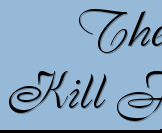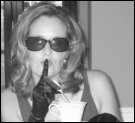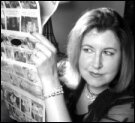Educating Heidi - January Noir
For a peek at what all this fuss is about, click here. Basically, in my endless search for enlightenment, I have chosen to undertake a genre journey, and to send you all some postcards from each trip.
So, in January, I packed the suitcases and headed back in time to get a feel for the grand-daddies of noir. Now, you have to understand, the process by which I select the authors is very painstaking – I ask people who I should read and then I go and get books by the ones I remember. On any chronological list of noir, one will find Hammett and Chandler at the very beginning. So I started there.
Of all the novels of Hammett, the one I recognized right off was The Maltese Falcon. I’d only ever caught bits of the beginning, middle and end of the movie, so I thought it wasn’t disqualified. And I wish I’d read it sooner. I mean, the description of Spade rolling a cig in the beginning of chapter two was exactly the primer I could have used back in college for rolling…well, that “left forefinger and thumb pinching” specificity - it would have come in handy back in the day. The whole rest of it was a lesson too – in exactly what we mean when we say “show, don’t tell.” There is not one bit of extraneous exposition in the book. We see and experience only what we would as a fly on the wall. For me (and I know I’m treading on holy, and therefore dangerous, ground here) it was a bit tedious at times. I appreciated the asceticism of it and the characters and dialogue were spot on, but I can’t say I’m one of Dashiell’s Darlings.
I’m going to skip over Chandler right now, because that’s what I did in my reading. Next up for me was black, contemporary noir author Walter Mosley’s Devil in a Blue Dress. Again, didn’t see the movie (even though Denzel makes me heave a big sigh) and I’m glad of it, since I, like many others, apparently, don’t think of Denzel as the right touch for Easy Rawlins. He’s too polished. Easy is rougher around the edges – not in a thug kind of way, but in a searching, still forming way. I put this book down with that type of literary glee I get sometimes – happy in the knowledge that there were plenty more where that came from. Character and dialogue mean the most to me as a reader, I think, but here I appreciated also the mid-century setting and the clipped sentences of the man telling me what I needed to know. Mosley has created a set of characters and a world where I won’t care too much what the story is – just take me along for the ride, please.
So, next – a contemporary author writing about contemporary times – I was at a workshop a year and a half ago with James Sallis as teacher. I’m embarrassed to say I wasn’t too impressed. It was fine, as these things go, but the experience didn’t make me want to run out and read the man. What did were the reviews he got for the novella, Drive, and I think I might have paid much closer attention if I’d read his work before the workshop. I read this in one sitting (okay, I got up to let the dogs out once). Can noir be poignant? Isn’t that an oxymoron? Alright – how about “poignant for tough guys.” This was third person and not even a consistent close third. It wasn’t linear and I had a couple of moments of “when am I?” but that was probably just me. The structure wasn’t a mistake, I’m sure, since half of the experience of reading Drive was in the emotions Sallis pulled me through. I don’t equate that tugging with noir, which I view as starting at an emotional low and, if anything, taking me lower. Maybe it was that this is a stand-alone – a clear character arc that actually comes through to the end instead of, as with some series characters, beginning at the end, or stopping somewhere along the way. Driver came close to following a hero’s journey. Writing in phrases as often as in sentences, Sallis conveys his meaning in a sparse style that doesn’t leave anything out.
Okay – back to Chandler. I’m reading The Long Goodbye. It is also The Long Book. Most noir is short, but this one clocks in at close to 400 pages, which is why I’m not finished on time. From what I’ve read so far, I know this. It is Chandler that is the “noir” that has crept and oozed into my awareness without my having read much of the stuff. It is his first-person, sassy voice that I hear in my head when I think of “noir.” There is a rhythm to the voice, a long spate of “talk” and then a clipped bit to follow. It lulls me and I’m enjoying it.
Well, that’s it for January Noir. I’m hoping to pick up some female noir authors soon. Suggestions are welcome. Next month, tune in for Educating Heidi: Romantic Suspense. And, in the meantime, check out my Regina Harvey noirish short story, “Catch Me Waiting,” published over at Shots UK. Our own (if Diana will be so kind as to share) Mr. Thrilling calls it “a short blast of sex and violence,” and who couldn’t use that to round out their week?















